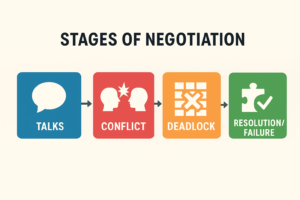Treaty Impasse: When Diplomacy Hits a Dead End
Overview
In international relations, not every dialogue ends in success. Sometimes negotiations reach a standstill where no side is willing to compromise. This situation is known as a treaty impasse. It represents a point in diplomacy where talks stall, agreements are blocked, and both parties remain locked in their positions.
A treaty impasse is not unusual in world politics. From nuclear arms negotiations to climate change conferences, nations often face difficulties in reconciling their strategic interests, domestic politics, and global commitments. For CSS aspirants, understanding this concept is vital because it links to current affairs, International Relations (IR), and Pakistan Affairs.
Why Do Treaty Impasses Occur?
A treaty impasse happens due to multiple reasons:
- Conflicting National Interests – Countries may have opposing strategic or security priorities.
- Domestic Political Pressures – Leaders avoid agreements that may seem unpopular at home.
- Power Imbalance – When one country dominates, weaker states resist unequal terms.
- Mistrust and Historical Grievances – Past betrayals or broken promises create hesitation.
- External Influence – Great powers or alliances may push countries to block negotiations.
Notable Examples of Treaty Impasses
- USA–Russia Arms Control Deadlock: Talks over nuclear arms reductions (START and New START treaties) have often reached deadlock due to mistrust and geopolitical rivalry.
- Doha Climate Negotiations: Developed and developing nations frequently clash over emission cuts and funding, leading to repeated impasses.
- Palestine–Israel Peace Process: Multiple attempts at peace treaties (Oslo Accords, Camp David) have stalled due to deep-rooted political and territorial disputes.
- Afghanistan Peace Talks: Efforts to negotiate power-sharing between the Taliban, Afghan government, and international stakeholders faced repeated deadlocks.

Impact of Treaty Impasses on Global Politics
- Prolonged Conflicts – Deadlocks delay peace in conflict-ridden regions.
- Increased Tensions – Failure of negotiations can escalate hostility.
- Economic Consequences – Trade or climate-related impasses affect global markets.
- Shift in Alliances – When treaties fail, countries often look for new partners.
For CSS aspirants, linking treaty impasses with contemporary world politics strengthens essay writing and international relations answers.
Important Notes for Beginners (CSS-Oriented)
- A treaty impasse is essentially a stalemate in diplomacy.
- Common in peace negotiations, trade agreements, arms control, and climate treaties.
- Always connect examples with Pakistan’s role, e.g., Pakistan’s involvement in the Afghan peace talks.
- In exams, use case studies (Israel–Palestine, US–Russia, Climate talks) to support your answers.
Sample Questions for CSS Preparation
- What is meant by a treaty impasse in international relations? Discuss with examples.
- Why do peace treaties often end in a deadlock?
- How do treaty impasses impact global diplomacy and conflict resolution?
- Discuss the role of great powers in creating or resolving treaty impasses.
Vocabulary Help (For CSS English Section)
Word: Impasse
- Synonyms: Deadlock, Stalemate, Gridlock, Standstill, Bottleneck
- Antonyms: Breakthrough, Progress, Agreement, Advancement, Opening
Conclusion
Treaty impasses remind us that diplomacy is never easy. They highlight the complex intersection of politics, economics, and security in world affairs. While deadlocks may seem like failures, they are also part of the negotiation process. Many treaties succeed only after repeated impasses. For CSS aspirants, the key is to analyze why talks fail, how countries respond, and what strategies can break the deadlock.

